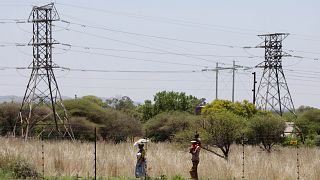South Africa
It is the annual census in the Balule Nature Reserve in South Africa's northern Limpopo province.
These rangers and researchers are doing a month-long count of all predators, specifically lions, and they use these impala to lure them in.
The team even resorts to a loudspeaker to draw the cats.
Ian Nowak, Balule Nature Reserve head warden there is a trick to it.
"So the sound is basically a calf in distress, which predators are programmed to respond to, and we do this so that we can call them in and then take ID photos, and identify the different individuals across the reserve. And we do this process once a year to get a take on our apex predators in the reserve."
The method is an ingenious way to track the lion population in a reserve.
"We have to do this process to count predators because it's difficult to count them from a helicopter in the aerial census - they hide under trees and it's difficult," he further stressed.
Twenty years ago, this was farmland with almost no lions. Last year, the census found 156 of them.
This goes against the curve – the world’s lion population shrank by 43 percent over two decades.
Here, they thrived. The secret lies in their habitat. As Balule and its neighbours transitioned to game reserves, they took their fences down.
It brought about an open system joining several private parks, the famous Kruger National Park and other areas into Mozambique 100 kilometres away. The result is a massive wildlife area almost the size of Belgium.
**"Lions do incredibly well in this area mainly because there is a large enough space for them to operate. (In) the rest of Africa habitat loss is the biggest threat to, to lions, all over the continent. And here they are flourishing because there's a large enough area that's well managed. And you know, your apex predators are symptomatic of a well-run system," **Ian Nowak, said.
Overall, the news is good for lions in South Africa, thanks to government conservation efforts -- helped by the inducement of tourists who are willing pay to see the animals. Private investors have also stepped in.













Go to video
Semenya ruling shakes foundations of gender rules in sport
01:53
SMES under pressure as business confidence hits four-year low in South Africa
Go to video
Former South African deputy president David Mabuza dies at 64
01:05
South Africa: year of power marred by new scandal in coalition government